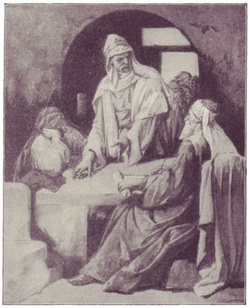
At that time: Jesus spake this parable unto his disciples: There was a certain rich man which had a steward; and the same was acccused unto him that he had wasted his goods.
The lord commended the unjust steward, because he had done wisely though wickedly. The lord, although himself defrauded by it, could not but praise the shrewdness of his dishonest servant, because he had cheated him with profit to himself. How much more will our Master Christ, who is above any defrauding by us, and is himself the great Forgiver of debts, praise us if we deal indulgently with those who are to believe in him?
After he had spoken this parable the Lord saith: Make to yourselves friends of the mammon of unrighteousness. This word: Mammon: is not Hebrew but Syriac, and is to be interpreted in the sense of our phrase: Filthy lucre. If then filthy lucre (as we call it) can be so used by them that have it as to bring about the profit of righteousness, shew much more can they who, like the Apostles, have stewardship of the mysteries of God (which are true and clean riches) profit themselves, even everlastingly, by their right use of such things?
Hence it followeth, as the Lord saith: He that is faithful in that which is least, (that is, in matters pertaining to the body,) is faithful also in much, (that is, in spiritual things,) and he that is unjust in the least, (that is, by not sharing with his needy brother those things which God hath created for the use of all,) is unjust also in much, (that is, he will deal out spiritual things unfairly, not according to need but with respect of persons.) Thus it is as though the Lord saith: If ye have not been faithful in the use of earthly riches which pass away, who will commit to your charge the true and everlasting riches of the Word of God?




